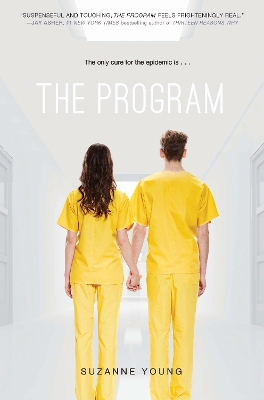Reviewed by Joséphine on
There is this whole paranoia surrounding teenagers committing suicide. Parents are worried of losing their children, so they will do anything to keep them safe. Since the state has instituted The Program, there is renewed hope that their children will recover and live because everyone who goes in comes out cured. Identifying teens who are at risk means administering a daily questionnaire in school to assess their likelihood of also committing suicide. Extreme emotions also are indicators, especially when crying is involved. Whenever Sloane feels like crying then, she hides. How long she can keep this up, not even she knows.
The overarching question of the first book for me is whether The Program exists to cure depression and suicide or if it actually drives teens towards depression and suicide. Some would rather die than undergo treatment because apparently it also means memory loss. Why others took their lives though remains a mystery. When it comes to Sloane's brother, nobody seems to know what drove him to take his own life. That is what makes everything all the more uncertain and scary at the same time.
For all the focus that has been cast on suicide though, The Program surprisingly isn't all that much about suicide. Yes, suicide drives the plot but otherwise, suicide as a subject matter isn't dealt with all that much, so I was rather disappointed about that. I really hope that the sequel, The Treatment, will address these issues. Instead, there is a huge emphasis on the relationship between Sloane and James. I didn't expect this extent of romance in the plot, and I wish I had known that because then I probably would've read a few other books I've been wanting to read first. Although, I did like the idea of how emotions and memories affect people and how they can be tampered with. I think that's what made this book stand out for me. Also, the transition of Sloane's voice, as the narrative was from her first person point-of-view, was very well thought out, portraying her transition phases very very well. At the same time though, some characters got lost in translation because even though they seemed to be important to Sloane, they came off more as extras.
Despite detracting from the seriousness of the issue of suicide, there still were dark undertones. Some of the events really did shock me, while others completely disgusted me. Some of these situations were disturbing and I appreciated that the characters themselves did not always have the perfect answers or solutions. They were victims of their circumstances, which was made evident through the narrative.
Overall, I think that The Program is a good book and that The Treatment has great potential if it addresses all these major lingering questions of the first book in the duology. The voice is strong, and the narrative flows well. The premise allows for a lot of reader engagement with gripping events and intense emotions. However, the plot does have a lot of gaps for the reader to fill that might leave some frustrated. As expected with any series, there is a cliffhanger. (I only realized then that this book is part of a series. For some reason, I expected a stand-alone.)
This review is also available at dudettereads.com.
Reading updates
- Started reading
- 18 December, 2013: Finished reading
- 18 December, 2013: Reviewed
